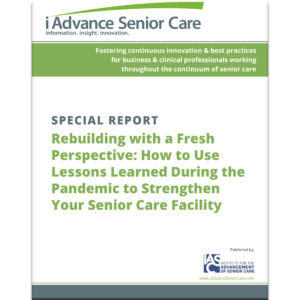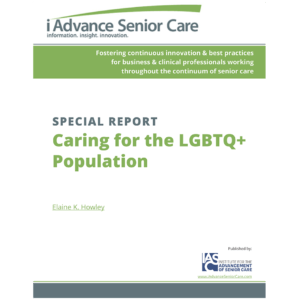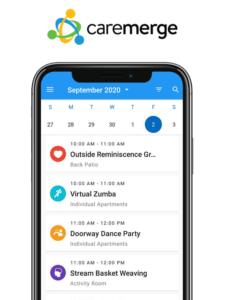Strategies to Combat Pandemic Fatigue in Senior Care Facility Staff

Dr. Wilfred Van Gorp, director, Cognitive Assessment Group
The COVID-19 pandemic has created significant, ongoing stress for senior care facility staff. That long-term stress and the continued uncertainty that surrounds the pandemic can lead to pandemic fatigue.
Caregivers and staff experiencing pandemic fatigue may experience emotional effects that affect their well-being and their abilities to do their jobs. As we head into winter and the pandemic nears a year in length, it’s essential that senior care facility upper-level staff understand how to recognize and handle pandemic fatigue in staff.
Understanding Pandemic Fatigue
According to UCLA Health, pandemic fatigue is a feeling of exhaustion that is caused by the effects of this pandemic. People suffering from pandemic fatigue may feel burned out, and they can experience many emotions including fear, anxiety, loneliness, and hopelessness. People may feel edgy or nervous, have difficulty focusing, lack motivation, argue more than normal with others, experience uncontrollable and racing thoughts, and withdraw from others.
Dr. Wilfred Van Gorp, Director of the Cognitive Assessment Group and former President of the American Academy of Clinical Neuropsychology, notes that pandemic fatigue is widespread today. “I call it the 2020 adjustment factor,” he explains. “We have a chronic stress situation. Every patient tells me that they’re experiencing stress, and that is a normal reaction to the degree of isolation that’s part and partial of self-isolation and reduced socializing.”
Pandemic fatigue is particularly difficult for caregivers. Dr. Van Gorp explains that the added stress of the caregiver burden can make pandemic fatigue more severe, especially for staff who work in senior care settings. “Here, you have the added stress of a caregiver burden of a highly vulnerable population that has a high mortality rate,” he says.
Caregivers for seniors have the stress associated with a normal job, plus the burden of knowing that a certain percent of their patients will naturally pass away. With the pandemic, if patients get sick, this vulnerable population will have a significantly greater mortality rate. This creates additional stress on the caregiver. Caregivers may also worry about potentially transmitting the virus to residents, and there’s always concern about contracting the virus and getting sick, themselves.
Recognizing Pandemic Fatigue in Senior Care Staff
Carefully watching for pandemic fatigue can allow a business to help support staff members who are in need. Dr. Van Gorp notes that one of the first signs of pandemic fatigue in the workplace is often that staff become less efficient or make mistakes in their work. This in analogous how children under stress often experience declining grades. Staff may also complain that they didn’t get enough sleep, since high degrees of stress often affects sleep.
“It’s important to take what people say seriously,” says Dr. Van Gorp. “Staff report that they’re under stress or that they don’t know if they can keep going – people often vocalize their concerns.” He emphasizes that it’s important that colleagues and supervisors listen to what staff are saying. A facility should provide staff with a help line to call or colleagues to consult if they hear concerning comments from coworkers.
Supporting Mental Health During Pandemic Fatigue
A facility should have a plan and resources in place to help staff who exhibit signs of pandemic fatigue. An employee assistance program, a hotline number where staff can call and anonymously speak with a counselor, and the availability of virtual mental health counseling services are all valuable tools that a facility should arrange before they’re needed.
Certain daily activities can help to support staff mental health during this time. Dr. Van Gorp advocates that staff:
- Get enough sleep
- Stay on a consistent sleep-wake cycle
- Have a lot of light in their homes
- Stay active physically and exercise at home
- Eat regular meals
It’s also essential for staff to understand that they can’t control or prevent everything that happens in the workplace. “We all tend to think that somehow we’ve played a role, or something is our fault,” says Dr. Van Gorp. “Staff can’t take responsibility for everything that happens around them. Supervisors and upper-level staff can help employees to maintain that essential balanced, objective perspective.
Most importantly, senior care facilities need to recognize that pandemic fatigue exists, and that it’s affecting many people during this time. By understanding the signs and establishing steps to take to support staff who may be experiencing this fatigue, a facility can help ensure that staff have the resources they need to navigate this period.

Paige Cerulli is a contributing writer to i Advance Senior Care.
Related Articles
Topics: Activities , Administration , Executive Leadership , Featured Articles , Risk Management , Staffing , Training











